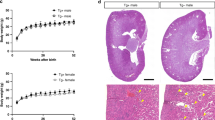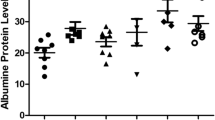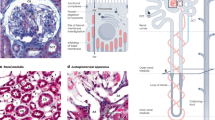Abstract
From all that is known about the renal function of new-born infants, it is now clear that their glomerular filtration-rates are considerably lower than those of adults, and also their clearances of urea and sodium chloride1. These discoveries have an important bearing on clinical practice, but much more information is required about the way in which the kidney of an infant reacts to changes in the internal environment. Accordingly, some experiments have been made to study the response of the kidney in new-born infants to a considerable rise in the osmotic pressure of the body. The children used for these experiments had all been born with inoperable meningo-myelocoeles. Healthy adults have been used as controls.
Similar content being viewed by others
Article PDF
References
McCance, R. A., and Young, W. F., J. Physiol., 99, 265 (1941).
Hervey, G. R., McCance, R. A., and Taylor, R. G. O., Nature, 157, 338 (1946).
McCance, R. A., and Wilkinson, E., J. Physiol, 106, 256 (1947).
Author information
Authors and Affiliations
Rights and permissions
About this article
Cite this article
DEAN, R., MCCANCE, R. Response of New-born Children to Hypertonic Solutions of Sodium Chloride and of Urea. Nature 160, 904 (1947). https://doi.org/10.1038/160904a0
Issue date:
DOI: https://doi.org/10.1038/160904a0



